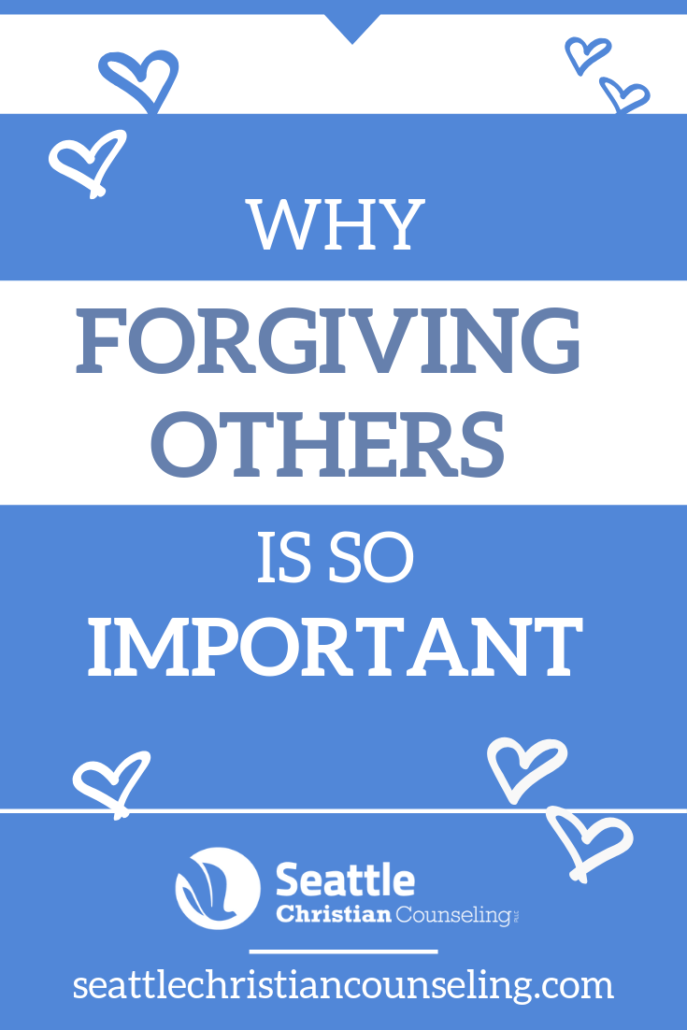Why is forgiving others so hard to do? How can forgiving others benefit the person who is forgiving? Learn more in this article about forgiveness and mental health.
Forgiving Others from the Heart
Get rid of all bitterness, rage, and anger, brawling and slander, along with every form of malice. Be kind and compassionate to one another, forgiving each other, just as in Christ God forgave you. – Ephesians 4:31-32
Forgiving others is very hard to do in this day and age. Nowadays, society emphasizes much the love of self, encouraging people to always stand up for themselves. Learn more through San Diego Christian Counseling.
While this is good to an extent, as abuse and other forms of injustice should never be tolerated, it has also made it increasingly difficult for people to forgive as they believe that they need to protect their personal honor, even if it is just a minor slight.
Sadly, when one is unable to forgive, the hurt and pain linger in the mind, affecting a person in many different ways. Though contrary to the ways of the world, biblically, forgiveness is something everyone should strive to do, for their own sake and others.
The Effects of Not Forgiving Others from the Heart
 Lots of people today continue to hold on to their hurts. Some claim the bitter memories serve as motivation to become better than whoever stepped on them in the past. Others choose not to forget so that they can truly savor their triumph when they defeat their rival. And then there are those who cannot forget and forgive as their past trauma continues to haunt them and stir up hateful thoughts.
Lots of people today continue to hold on to their hurts. Some claim the bitter memories serve as motivation to become better than whoever stepped on them in the past. Others choose not to forget so that they can truly savor their triumph when they defeat their rival. And then there are those who cannot forget and forgive as their past trauma continues to haunt them and stir up hateful thoughts.
Regardless of the reason, harboring such negativity can really take a toll on a person. Mentally, such bitterness just adds to a person’s daily stress, affecting one’s concentration and even memory. It can also lead to mental health disorders such as anxiety and depression.
This can also be felt physically. The stress of recalling past hurts lowers the body’s immune system, making a person more susceptible to sickness. There may also be daily body pains (e.g. headaches, muscle aches) and difficulty sleeping or eating.
Relationally, the past pain affects a person’s bond with those who have slighted them – be they colleague, friend, or family member – preventing the relationship from growing stronger. Such hurt can also cause additional problems as the bitter memory may hinder a person from widening their social circle or becoming intimate once more (e.g. fear of loving again).
Moreover, this bitterness affects a person spiritually as this hate for our brother or sister-in-Christ is directly against what God wants us to do, which is to forgive. Because of this, the person may choose to avoid spiritual activities, like praying or going to church, believing they are no longer worthy of God’s love.
Misconceptions and Clarifications about Forgiving Others
Many times people do not forgive because of their misunderstandings about forgiveness. These, however, need to be corrected for the person’s sake and for others.
Misconception 1: Forgiveness excuses the offender
 One wrong idea is that forgiving means condoning the offender’s actions or behavior. Not only does the offender get a free pass, but it also makes the victim feel powerless about the incident. Since no one wishes to feel that way, the person continues to feed their anger – through negative thoughts and even actions (e.g. backbiting) – which may make them feel more in control of the situation.
One wrong idea is that forgiving means condoning the offender’s actions or behavior. Not only does the offender get a free pass, but it also makes the victim feel powerless about the incident. Since no one wishes to feel that way, the person continues to feed their anger – through negative thoughts and even actions (e.g. backbiting) – which may make them feel more in control of the situation.
The Clarification:
Forgiveness, however, never means approving the wrongs done, as everyone should be loved and respected. Instead, forgiveness means NOT allowing the past hurt to have a hold on one’s life. As earlier mentioned, the more such bitterness lingers in the mind, the more the person suffers internally, and even physically. But when a person forgives, the mental and spiritual burden is lifted, allowing them to feel at peace once more. It may also heal a lot of physical ailments.
Misconception 2: Forgiveness means granting legal mercy
For victims of crime or abuse, it can be difficult to forgive as they mistakenly think it means allowing the offender to escape punishment. As there may be a fear of possible retribution or future harm to someone else, forgiveness for many is often out of the question.
The Clarification:
For legal matters, forgiveness does NOT mean pardoning someone of the crime. For the public’s safety or for the recovery of resources, legal proceedings should generally continue on (with possible exceptions if it really is a very minor matter). Again, the point of forgiving someone, even one who has caused much pain to a person or their family, is to free up the mind and spirit so that the person can live normally again.
Forgiveness here also means treating the offender with dignity and compassion, even if the crime was grave. If not, then a person may become prejudiced against similar offenders or even suspected offenders in the future.
Misconception 3: Forgiveness means reconciliation, even if you do not want to
Others choose not to forgive because they believe it means they have to reconcile with the other, even if they do not want to. For former sweethearts, this may be a big no-no as they have already found someone else or they have already realized they were not meant to be. For business partners, this may be seen as a useless endeavor as there may be no point of working together again.
The Clarification:
 Choosing to forgive does NOT mean one has to always get back together again. In situations like exes or business dealings gone sour, it really is not logical to do this. As in the first two misconceptions, forgiveness here is to stem the spread of internal negativity, lest a person continue to hold back in future relationships with others. Forgiveness also means still respecting the rights of the one who hurt them to prevent other untoward incidences from occurring (e.g. defaming the offender or other acts of revenge).
Choosing to forgive does NOT mean one has to always get back together again. In situations like exes or business dealings gone sour, it really is not logical to do this. As in the first two misconceptions, forgiveness here is to stem the spread of internal negativity, lest a person continue to hold back in future relationships with others. Forgiveness also means still respecting the rights of the one who hurt them to prevent other untoward incidences from occurring (e.g. defaming the offender or other acts of revenge).
It should be noted, however, that in family matters, particularly when the issue is between spouses or children, reconciliation should generally be the goal for the family to properly function once more.
Misconception 4: Forgiveness means forgetting what happened
Another misconception is that forgiveness means erasing one’s mind of the incident. However, with our God-given minds, it can be very difficult to simply forget. And if the experience was particularly painful, most really do not want to forget to prevent similar future mistakes.
The Clarification:
Forgiveness NEVER means forgetting the painful lessons of the past. If this were to happen, then definitely history would repeat itself. People are meant to remember past experiences to prevent the bad ones from occurring again. Choosing to forgive the bad that has happened allows the person to appreciate the present and positively move forward, rather than always wallowing in the past.
The Phases of Forgiveness Therapy
Despite the very clear benefits of forgiveness, it can really be difficult to forgive. A person’s natural instinct is to protect themselves which makes it hard to let go of the negative emotions. Fortunately, there is a four-step method to work towards forgiveness.
The Uncovering Phase
In the uncovering phase, the one offended objectively views the transgression to see how it has affected their life. Has it disrupted many key areas in their life? Have they changed for the worse because of it?
By doing this, the person may begin to understand the results of an unforgiving heart in their life. Once understood, the individual may then begin the necessary steps to overcome its effects.
The Decision Phase
In the next stage of therapy, the person is taught more about the nuances of forgiveness. Proper knowledge of this allows the person to truly decide if and when they decide to forgive.
But as in many big decisions in life, people may need more time before they can forgive and move forward, and that is alright. This stage may be revisited later on once the person has had more time to reflect.
The Work Phase
In this phase, the offended person is asked to understand the perspective of the offender: What was their past like? What might have been their motivation for the transgression? The hope here is that the person’s heart will begin to change as they are able to comprehend the reasons behind what had happened.
The Deepening Phase
 In the final phase, the person is asked to find new meaning in the experience. Instead of simply thinking of themselves as a hapless victim, they are encouraged to identify the positive changes that have occurred. Did they become more loving? Are they stronger now or more confident?
In the final phase, the person is asked to find new meaning in the experience. Instead of simply thinking of themselves as a hapless victim, they are encouraged to identify the positive changes that have occurred. Did they become more loving? Are they stronger now or more confident?
By acknowledging the positive growth in their life because of what had occurred, it may become possible to finally forgive.
Understanding God’s Forgiveness
Despite the availability of such therapeutic steps, many still have difficulty learning how to truly let go and forgive without dreaming of vengeance in their unguarded moments. This is because of mankind’s sinful nature that seeks self-protection and the uplifting of self.
Real forgiveness, where the spirit is at peace, cannot truly be understood without knowing Jesus Christ. The way He lived on earth, obeying the Father while humbly showing his disciples how to live and love, is the best example of what it means to be human. And the way He died for us, even if we did not deserve such a sacrifice, is the perfect model for forgiveness.
If a person wants to be able to let go of the past hurts that are holding them back, they need the love of Christ in their life. And this can only be done by intentionally getting to know Him through prayer and the reading of Scripture.

Seeking Christian Counseling for Forgiveness
In Christian counseling, the latest counseling methods will be used to help the individual better understand what had happened, their current emotional state, and the effects on their life. They will then be taught what can be done to positively change their perspective so they can forgive.
But most importantly, the person will be introduced to the love and mercy of God through prayer and Scripture. By knowing more about Jesus’ compassion for sinners (of which we all fall under), the person will be able to truly understand what forgiveness entails, allowing them to have true internal peace.
If you or a friend is having difficulty forgiving others, seek professional help soon. God is asking you to forgive so that you can experience life to the fullest. Counselors at San Diego Christian Counseling can provide the support you need.
“Forgiveness”, Courtesy of Felix Koutchinski, Unsplash.com, CC0 License; “Empty Hands”, Courtesy of Jeremy Yap, Unsplash.com, CC0 License; “Hand Across the Water”, Courtesy of Lukas, Pexels.com; CC0 License; “Touch of the Other World”, Courtesy of Akshay Paatil, Unsplash.com, CC0 License
